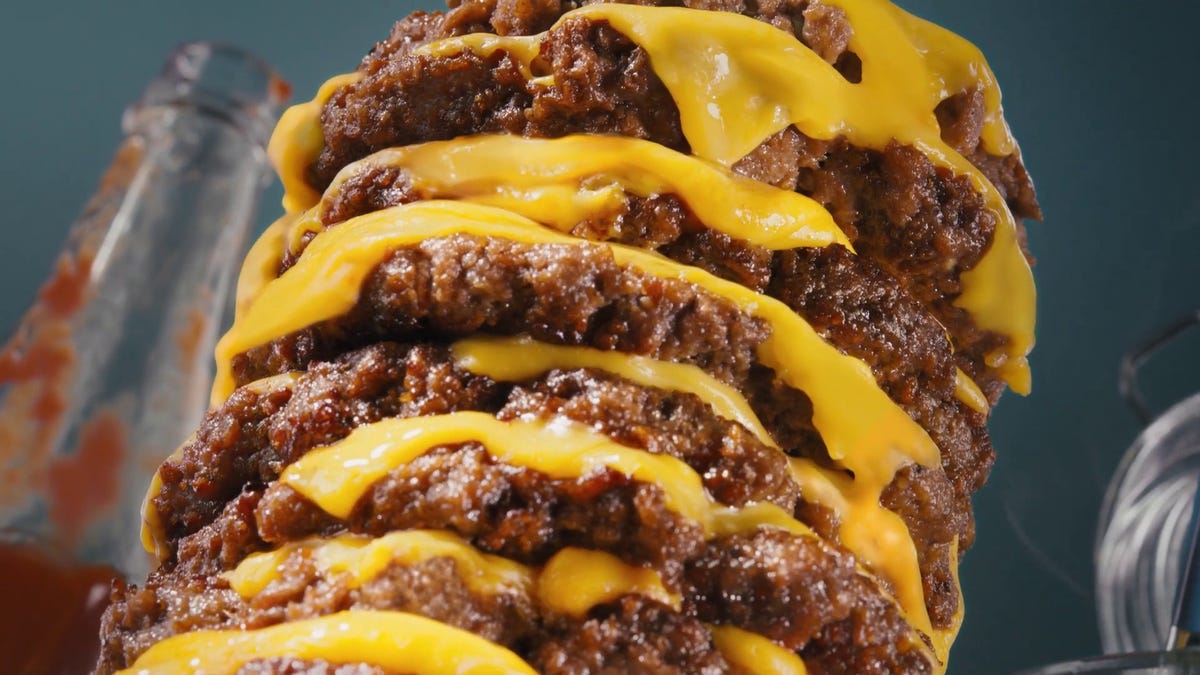No, Joe Biden's new climate plan won't limit meat consumption
False info about Biden's new climate plan are circulating. Here's a quick fact check...

Despite false rumors, President Joe Biden won't force you to replace your burgers with plant-based meat alternatives.
Last week some politicians and media commentators have claimed President Joe Biden is planning to limit meat consumption as part of a climate change plan. That's false. Neither Biden nor the White House have indicated curbing meat-eating, or altering Americans' diets in any way, is part of that plan.
But that hasn't stopped some Biden critics from fueling flames about the perceived threat.
On Friday, Larry Kudlow, former economic adviser to Donald Trump, said the climate plan would go so far as to make Americans drink "plant-based beer" (aka...beer). Rep. Marjorie Taylor Greene, a Republican from Georgia, called Biden "The Hamburglar" in a Sunday tweet, while Texas Gov. Greg Abbott shared false information from Fox News claiming the plan will "cut 90% of red meat" from Americans' diets and limit everyone to "one burger per month."
The Hamburglar.
— Marjorie Taylor Greene 🇺🇸 (@mtgreenee) April 25, 2021
“No burgers for thee, but just for me.” pic.twitter.com/vXb4gCGsgW
These unfounded declarations sparked heated comments over the past week about meat consumption, plant-based alternatives and climate change. Here's everything to know about the uproar and the debate over plant-based meat substitutes.
How did the meat replacement rumor begin?
A report by The Washington Post this Monday traces the false claims about Biden reducing meat intake to "a Daily Mail article that baselessly speculated about measures that could accomplish Biden's goal of cutting greenhouse gas emissions in half by 2030."
That article cites a 2020 University of Michigan study on the impact reduced meat consumption can have on greenhouse gas emissions. The study mentions a scenario in which Americans each eat 4 pounds of red meat a year, which The Daily Mail falsely linked to Biden's climate plan by running an infographic saying those measures are "what will be required to meet Joe's green targets."
How did the misinformation spread?
Fox News then took that false data and shared it on air in a graphic called "Up In Your Grill: Biden's Climate Requirements." The graphic repeats unfounded claims about the president's plan limiting individuals to 4 pounds of meat a year, being allowed one burger a month and having to cut 90% of red meat from their diets.
Sharing a screenshot of the graphic, Gov. Abbott wrote: "Not gonna happen in Texas!"
Not gonna happen in Texas! pic.twitter.com/zqYS9kH8CU
— Greg Abbott (@GregAbbott_TX) April 25, 2021
The White House didn't immediately respond to a request for comment.
What does this have to do with plant-based meat?
The controversy, though rooted in falsehoods, has nonetheless spurred debate about plant-based "meat" and its role in potentially curbing climate change. Studies have suggested swapping traditional meat with plant-based alternatives could reap significant benefits for the environment. A 2018 paper by Hanna Tuomisto of the University of Helsinki found a potentially large reduction in greenhouse gases with meat alternatives, compared with raising cows and sheep for consumption.
Impossible Foods, the maker of popular lab-created meat alternatives Impossible Burger and Impossible Pork, has said creating plant-based meats has a "much smaller environmental footprint than meat from animals," and that it takes a fraction of land and water to make these kinds of faux products.
Companies also say their lab-grown products could help people more easily curb their red meat intake. A 2020 Gallup survey of people cutting back on meat found the majority were doing so for health reasons, followed by concerns about the environment, food safety and lastly animal welfare.
But comments like Kudlow's reflect a perceived threat among some that replacing traditional meats with plant-based ones will destroy American values and traditions.
"Get this: America has to stop eating meat, stop eating poultry, fish, seafood, eggs, dairy, and animal-based fats," Kudlow said on his Fox Business show last week. "OK, you got that? No burgers on July 4. No steaks on the barbie. I'm sure middle America is just going to love that. Can you grill those Brussels sprouts?"
That response is reflective of a national, often politically driven divide over what plant-based alternatives represent. Some see it as another (perhaps more sustainable) food option, while others see it as a cultural threat that pits against American ideals. A Monday Vox report notes that when Sen. Jon Ossoff, a Democrat from Georgia, ate at a vegan burger restaurant during the 2020 campaign, opponent David Perdue responded by tweeting a picture of himself next to plates of bacon, with the caption: ".@ossoff can have the plant burger, we'll take the all-star special. Pick your side, Georgia."
If Biden's climate policies don't address meat consumption, what do they address?
So far, Biden's climate policies include reducing emissions 50%-52% by 2030 compared to 2005 levels. The White House has also said it hopes to reach net-zero emissions by 2050 through measures like funding lower-emission buses and expanding access to electric vehicle charging stations. The president's American Jobs Plan includes funds to build 500,000 electric vehicle charging stations across the US by 2030, and calls for point-of-sale rebates when buying a new EV.

